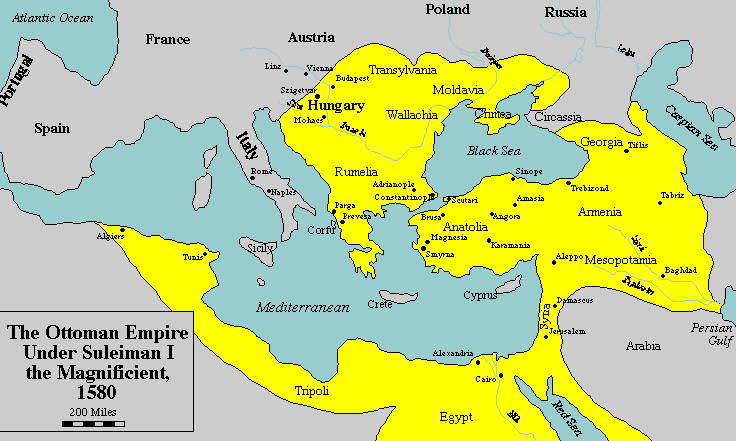The Ottoman Empire stands as one of the most significant and influential empires in world history, spanning over six centuries and three continents. Its origins can be traced back to the 13th century, and its impact on the political, cultural, and economic landscapes of the time continue to shape the modern world.
Rise to Power (13th-15th centuries):
The roots of the Ottoman Empire can be found in the small Anatolian state led by Osman I in the late 13th century. Initially, it was a modest principality on the periphery of the Islamic world. However, Osman’s strategic military successes laid the foundation for the expansion of his territory.

Osman’s son, Orhan, continued the expansion, capturing the city of Bursa in 1326. Bursa became the capital of the burgeoning Ottoman state, marking the beginning of a period of territorial growth and consolidation. The Ottoman Empire’s military prowess and strategic alliances allowed it to expand into the Balkans and establish control over key trade routes.
The 15th century saw the rise of Mehmed II, also known as Mehmed the Conqueror. In 1453, he achieved a historic feat by capturing Constantinople, the Byzantine capital. This event not only marked the end of the Byzantine Empire but also opened the gateway for Ottoman expansion into Southeast Europe.
The Golden Age (16th-17th centuries):
Under the rule of Suleiman the Magnificent (1520-1566), the Ottoman Empire reached its zenith. Suleiman’s reign is often referred to as the Golden Age due to the empire’s flourishing in various aspects.
Militarily, Suleiman’s forces conquered Belgrade, Rhodes, and most notably, Hungary. The Ottoman navy dominated the Mediterranean, challenging European powers. Culturally, the Ottoman Empire became a center of art, literature, and architecture. The famous architect Sinan constructed numerous mosques, bridges, and palaces that still stand today.
The Ottoman legal system, known as the Kanun, was also developed during this period. It helped to regulate the empire’s diverse population and contributed to the efficient administration of its vast territories.

Challenges and Decline (17th-18th centuries):
The latter half of the 17th century and the 18th century brought about significant challenges for the Ottoman Empire. Internal strife, economic difficulties, and military setbacks contributed to its gradual decline. European powers, particularly Russia and Austria, capitalized on the empire’s weaknesses, gaining territory at the Ottoman’s expense.
By the 19th century, the Ottoman Empire, often referred to as the “Sick Man of Europe,” faced increasing pressure from European powers seeking to exploit its weakening state. Nationalistic movements within the empire’s diverse population also threatened its unity.
Modernization Efforts and World War I (19th-20th centuries):
In the 19th century, the Ottoman leadership recognized the need for reform to strengthen the empire. The Tanzimat reforms aimed at modernizing the legal and administrative systems, introducing new technologies, and promoting education. However, these efforts were met with resistance from conservative factions within the empire.
The 20th century brought World War I, during which the Ottoman Empire sided with the Central Powers. The empire’s defeat in the war and the subsequent occupation of its capital, Istanbul, by Allied forces marked the final chapter of Ottoman rule. Mustafa Kemal Atatürk, a military leader, led the Turkish War of Independence and established the Republic of Turkey in 1923, officially putting an end to the Ottoman Empire.

Legacy:
The legacy of the Ottoman Empire is profound and enduring. The empire played a crucial role in shaping the geopolitical landscape of the Middle East and Southeast Europe. Its cultural and architectural contributions are visible in the historic monuments that still stand in Turkey and beyond. The Ottoman legal system and administrative structure have left a lasting impact on the regions it once governed.
However, the empire’s decline also laid the groundwork for the modern nation of Turkey, founded on principles of secularism and nationalism by Atatürk. The dissolution of the Ottoman Empire marked the end of a significant chapter in world history, but its influence is embedded in the cultural, political, and social fabric of the regions it once ruled.
